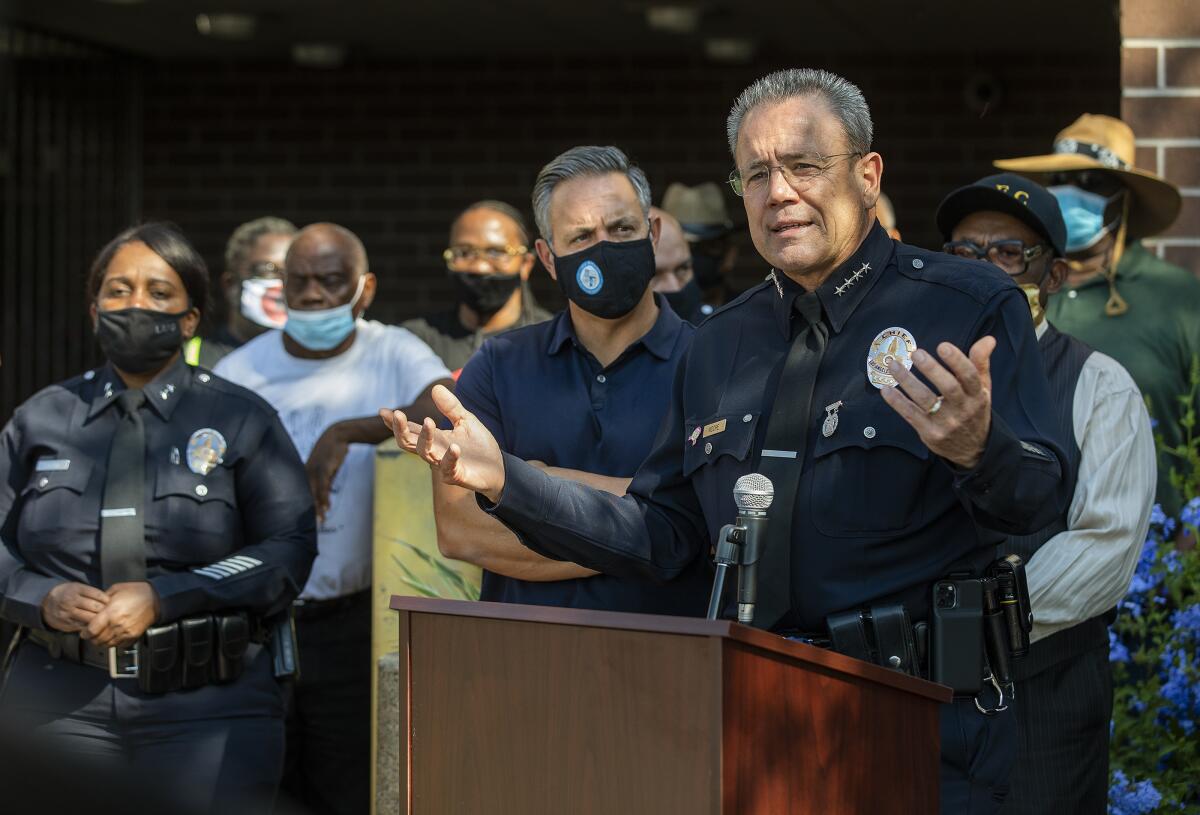LAPD Chief Michel Moore receives second term

The Los Angeles Police Commission on Tuesday reappointed Chief Michel Moore to a second term as head of one of the nation’s largest police departments.
The five-member commission reached its unanimous decision during a closed-door meeting knowing that Mayor Karen Bass, who in her role wields considerable power over the chief and department, supported the move — albeit with some caveats.
In a letter sent to the commission on Monday, Bass, who took office in December and campaigned on the promise of bringing more police accountability and transparency, said she believed Moore shared her desire to see the department improve its recruitment of “reform-minded” officers and change how it responds to calls involving the mentally ill.
She added that she expects the department to deliver on “[s]pecific actions toward” other goals, such as partnering with a new community safety office she’s launched and streamlining the hiring process to ensure that new officers get out on the streets more efficiently.
And Bass underscored public statements by Moore that he intends to step down after two or three years to make way for a new chief in advance of the 2028 Summer Olympics in Los Angeles. When he does so, she wrote, “a nationwide search will commence and a new Chief will be selected.”
In a statement, Moore said he was grateful for the commission’s unanimous decision and touted the progress he said the department made during his first term. He also acknowledged the concerns of his critics and said he had “listened intently” during conversations with Bass about needed reforms.
“There’s much to do and I am excited for the opportunity to continue this critical work,” he wrote.
Before the vote, Commissioner Steve Soboroff praised Moore as a leader who steered the department through the uncertainty of the COVID-19 pandemic and the national crisis over policing sparked by the 2020 killing of George Floyd by a Minneapolis police officer, among other challenges.
The vote came after just a few weeks of public hearings on whether to accept Moore’s bid for a second term, an unusually fast pace for a civilian body that has taken months when considering whether to reappoint previous chiefs.
On Tuesday, the panel heard from dozens of people who called in to the remote meeting and were overwhelmingly opposed to Moore’s reappointment. Richard Tefank, executive director of the Police Commission, said the panel then deliberated in private for about half an hour before reaching its decision.
The decision to keep Moore on had been widely expected as commission members had signaled their support for him, calling him an effective policing executive with the skills needed to run a complex organization like the LAPD.
Bass’ feelings on Moore, however, were less clear. And in light of her campaign promises to bring more accountability to the department, speculation over whether she supported Moore spiked when three people died in police custody at the start the year. One of the men was Keenan Anderson, who died several hours after an officer stunned him repeatedly with a Taser. LAPD officers also fatally shot two people in separate incidents in South L.A.
Critics seized on the deaths as evidence to support their claim that under Moore the department has not done enough to root out a culture of aggression among officers, and said he was unfit for a second term. In the weeks leading up to the vote, some embraced the social-media-fueled campaign “No More Moore.”
In her letter to the commission, Bass highlighted the three in-custody deaths, saying the fact that all three men appeared to be in the midst of mental health crises when they encountered officers highlighted “the need for continued and significant reform of how the city approaches public safety.”
As mayor, Bass does not have the direct authority to fire a police chief, which is a power reserved for the Police Commission and City Council. She can, however, replace commissioners with people of her choosing.
Under the City Charter, the City Council has the power to veto the commission’s decision. But such an effort would face an uphill climb, because a veto requires 10 votes. Seven of the council’s 15 members — Bob Blumenfield, Paul Krekorian, John Lee, Tim McOsker, Traci Park, Monica Rodriguez and Kevin de León — have voiced support for Moore or said they would not seek to overturn the commission’s decision.
Moore faces challenges, including running a department that is several hundred officers short of its allotted strength of about 9,500 officers, a gap that comes as the city grapples with homicides and shootings that remain above pre-pandemic levels. And Commissioners Eileen Decker and Maria “Lou” Calanche pressed Moore on his poor record of promoting women at Tuesday’s meeting. Recent department figures show that women account for only 17% of the LAPD’s command staff.
In Moore, the Police Commission chose to keep in place an experienced leader and an insider — a veteran who came up through the department’s ranks. He has a firm grasp of the department’s troubled history as a racist, abusive agency and its push over the last two decades to move past it, including through its time under a federal consent decree.
At the same time, however, reappointing Moore means sticking with a leader who carries the baggage of past political stumbles and who has been bruised professionally by a series of challenges — including surging violent crime, the COVID-19 pandemic, controversial police shootings, the explosion of a South L.A. neighborhood by a clumsy bomb squad, and predictive policing software that critics say unfairly targeted Black and Latino people who hadn’t committed any crimes.
Melina Abdullah, a frequent sparring partner of Moore’s, lamented people’s “short memories” in evaluating the chief’s first 4½ years as chief. She argued that Moore has pushed “this narrative of community policing” even though his officers continue to use aggressive tactics at demonstrations despite numerous studies and reports that faulted the department for how it responded to protests in 2020 and earlier.
“He wants to see police in every church pew and every park bench. And that’s not the role of police,” said Abdullah, a college professor and prominent civil rights activist who co-founded the Black Lives Matter movement. She added that the city deserved a leader “who is invested in real public safety beyond policing and understands that that means spending money in other areas.”
Moore’s supporters counter that his ability to navigate many challenges at once, most of which are not of his making, is a reason to reappoint him.
Times staff writer Kevin Rector contributed to this report.
More to Read
Sign up for Essential California
The most important California stories and recommendations in your inbox every morning.
You may occasionally receive promotional content from the Los Angeles Times.












